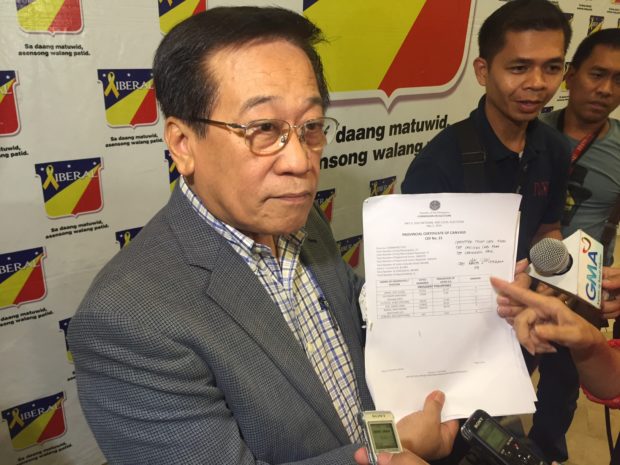
Election lawyer Romulo Macalintal (File photo by JULLIANE LOVE DE JESUS / INQUIRER.net)
Shifting to a federal form of government should be thoroughly discussed as it could lead to great changes in Filipino culture, election law expert Romulo Macalintal warned in a statement issued on Sunday.
“Once our system of government is converted into a federal form as proposed by our legislators, it might open the floodgates to the possible adoption of laws legalizing abortions, gay marriages, divorce and the use of hybrid election system in our country,” Macalintal said.
“Indeed, the various proposals involved in changing our form of government would practically result in changing or altering our time-honored culture, values and traditions,” Macalintal pointed out.
“As such, any change in our present Charter has to be thoroughly discussed and studied by those people who were given the noble and serious task of amending the fundamental law of our nation, especially by the members of the newly created consultative body on Charter change headed by former Chief Justice Reynato Puno,” he said.
“For sure, in their hands depend the future of our country and our people, and the dreams of our children and their children,” he added.
Under the proposed constitutional amendment, Macalintal said, the country’s regions would be transformed into states, each with its own “exclusive legislative powers” to enact laws on state and local elections, marriage, population management, labor and trade relations, and its justice system, among others.
“Each state will also have its own constitution, adopt its name, and choose a capital flag, anthem and seal,” he added.
“Hence, with the creation of different ‘states’ with its own legislative power, one state may legalize abortion, divorce, and gay marriage while others may not allow it or may provide certain restrictions if ever the same is legalized in their respective areas,” he added.
Some states may pass a law providing for manual election while others may go for full automated election system and others may adopt a hybrid system of election where both manual and automated systems are used.
There will also be a dramatic increase in the number of politicians under the proposed federal form of government, Macalintal said.
“At present, we only have 297 representatives from 234 legislative districts, including those from the party list systems and 24 senators,” he said.
Under the proposed charter, each state will have its own state assembly composed of two representatives from each province and one representative per highly urbanized cities (HUCs).
With 81 provinces and five HUCs, a total of 162 provincial representatives and five city representatives – or a total of 167 positions Ý would be added to the existing number of politicians in the country, while the existing positions in the local governments of provinces, cities, municipalities and barangays would be retained.
Earlier, the House of Representatives adopted Concurrent Resolution No. 9, which seeks to convene Congress into a constituent assembly (con-ass) to amend the Constitution.
The lower chamber is also pushing for a joint voting of the Congress, which the Senate is strongly opposing.
Lawmakers have yet to decide on whether the proposed charter change should be through a constitutional convention (con-con), where changes would be proposed by representatives elected by the people, or through a constituent assembly (con-ass) to be composed of the current sitting legislators. /atm